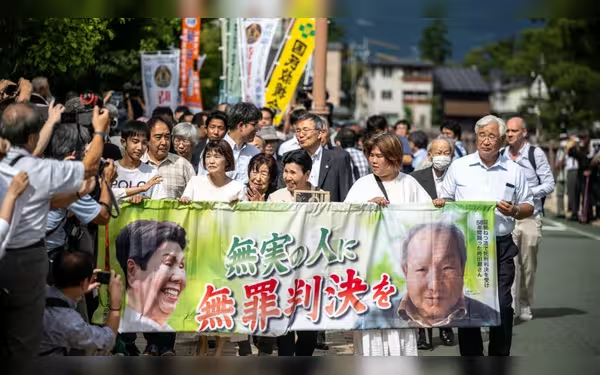Saturday, November 16, 2024 05:52 PM
Japan Acquits Longest-Serving Death Row Inmate Iwao Hakamata
- Iwao Hakamata acquitted after 56 years on death row.
- Court raises questions about Japan's justice system integrity.
- Hakamata's case highlights need for legal reform in Japan.
 Image Credits: france24
Image Credits: france24Iwao Hakamata, the longest-serving death row inmate in Japan, is acquitted after 56 years, raising critical questions about the justice system.
In a landmark decision, a Japanese court has acquitted Iwao Hakamata, the world’s longest-serving death row inmate, more than 56 years after his initial murder conviction in 1968. This ruling by the Shizuoka District Court marks a significant moment in Japan’s legal history, as it raises serious questions about the integrity of the country’s justice system. Hakamata, now 88 years old, was convicted of murdering his boss, the boss's wife, and their two teenage children, a crime he has always denied committing.
The court's ruling came after a retrial that was initiated by Hakamata and his supporters a decade ago. Judge Koshi Kunii stated, "The court finds the defendant innocent," a declaration that brought a wave of relief to Hakamata's family and supporters. Although Hakamata was unable to attend the court session due to his fragile health, his 91-year-old sister, Hideko, represented him and expressed profound gratitude for the verdict.
Hakamata's case has been a focal point of controversy in Japan, where capital punishment remains a widely supported policy. Critics argue that the justice system often holds suspects "hostage" through coercive interrogation techniques and reliance on questionable evidence. Over the years, numerous concerns have been raised regarding the validity of the evidence used against Hakamata, including allegations of fabricated confessions and mishandled forensic evidence.
Supporters of Hakamata gathered outside the court, waving flags and holding banners that called for a not-guilty verdict. One supporter, Atsushi Zukeran, expressed his confidence in the outcome, stating, "I am absolutely certain he will be acquitted" due to the doubts surrounding the evidence. However, he also acknowledged the emotional complexity of the situation, saying, "Part of me wouldn't be able to celebrate the acquittal entirely," highlighting the painful journey Hakamata and his family have endured.
Hakamata's ordeal began in 1966 when he was arrested and later convicted based on a confession he claimed was obtained through brutal police interrogation. The evidence against him included blood-stained clothing found in a miso tank, which the defense argued was planted. Despite the Supreme Court upholding his death sentence in 1980, Hakamata's supporters tirelessly campaigned for a retrial, which was finally granted in 2014.
As of December, there were 107 prisoners on death row in Japan, all awaiting execution by hanging, often with little notice. Hakamata's case serves as a stark reminder of the ongoing debates surrounding Japan's criminal justice system, often referred to as "hostage justice" due to its reliance on confessions obtained under duress.
This acquittal not only brings closure to a long and painful chapter for Hakamata and his family but also shines a light on the urgent need for reform in Japan's legal practices. As the nation reflects on this case, it is crucial to consider the implications for future justice and the protection of human rights within the system. The hope is that this ruling will inspire changes that ensure no one else has to endure such a harrowing experience.













